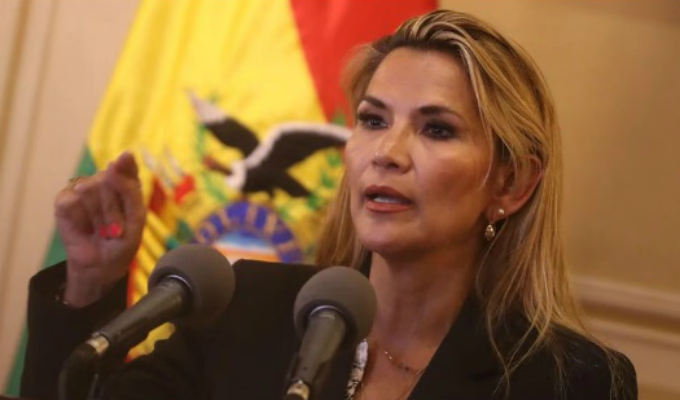
Bolivian Supreme Court annuls 10-year sentence, ordering release of former interim President Jeanine Áñez
Jeanine Áñez was released from prison in La Paz after the Supreme Court of Justice annulled her 10-year sentence for alleged constitutional violations.
November 6, 2025 - 11:13 AM ET • 2 min read
Jeanine Áñez, the former interim President of Bolivia (2019–2020), was released from prison on Thursday after the country's Supreme Court of Justice (TSJ) annulled the 10-year sentence she had been serving related to the 2019 political crisis.
The TSJ announced its decision on Wednesday, ordering the immediate release of the former leader after determining that her trial had involved "vulnerations to the legal order" and violations of her right to due process. Áñez walked free from the Miraflores Women's Orientation Center in La Paz on Thursday, having served four years and eight months in custody. She was seen exiting the facility holding a Bolivian flag and accompanied by her children.
In her first statements outside the prison, Áñez reiterated her long-standing defense regarding the events of 2019, stating that "there was never a coup d'état in this country; what there was was electoral fraud" that prompted Bolivians to protest and demand the respect of their vote.
The annulled sentence stemmed from the case known as "Golpe II" (Coup II), which investigated the manner in which Áñez assumed the presidency following the resignation of then-President Evo Morales in November 2019. She was arrested in March 2021 and subsequently convicted in June 2022 on charges including breach of duties and resolutions contrary to the Constitution and laws. The 10-year sentence was later ratified by the Bolivian judiciary in July 2023.
Romer Saucedo, President of the TSJ, confirmed the court's decision to annul the executed sentence. Saucedo explained that the judicial review found significant flaws that affected the fundamental rights of the former president.
The court's ruling implies that Áñez should have been tried under a special process reserved for high-ranking officials, known as a "trial of responsibilities," which requires prior authorization from the Plurinational Legislative Assembly (Congress). By prosecuting her through the common criminal court system, the judiciary violated established legal procedures, according to the TSJ.
The release comes weeks after the governing Movement for Socialism (MAS) party, which had pursued the legal cases against Áñez, suffered a significant electoral defeat in October.